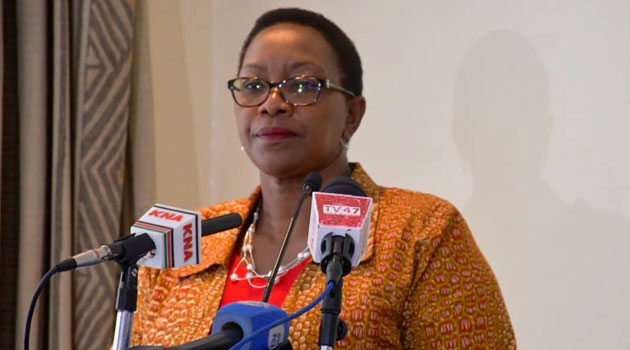
Health Cabinet Secretary Sicily Kariuki (pictured) says the numbers are set to increase even more, once the programme, which is part of President Uhuru Kenyatta Big Four agenda, is rolled out in all parts of the country by 2022/Afya House
NAIROBI, Kenya, Oct 24 – The Universal Health Coverage (UHC) currently being implemented at a pilot stage in four counties has seen a drastic increase in the number of people seeking health services from 20 per cent to 58 per cent.
The four counties are Nyeri, Isiolo, Kisumu, and Machakos.
Health Cabinet Secretary Sicily Kariuki says the numbers are set to increase even more, once the programme, which is part of President Uhuru Kenyatta Big Four agenda, is rolled out in all parts of the country by 2022.
She spoke on Thursday after receiving a report by a panel of experts from the National Health Insurance Fund (NHIF), which recommends the introduction of a third programme dubbed Universal Scheme to cater for 75 percent of Kenyans who are under no insurance coverage.
“In alignment with the Global Evidence, the pilot exercise demonstrates that investments towards Primary Health Care are able to address at least 80pc of the disease burden,” she said.
“This greatly aligns with that champions allocation of resources and investments towards Primary Health Care Services, including preventive and promotive services. Community participation and Ownership is an essential component in the success of the Universal Health Coverage Program. The citizens of the four counties have expressed their appreciation of the UHC Program and have taken collective responsibility in leading healthy lifestyles and seeking health services.”
CS Kariuki said the sustainability of the UHC programme is nested in investments in the health system including a focus on the financing architecture of the healthcare system.
“We have learnt that it is important to utilize a financing mechanism that delivers efficiency and also ensures the pooling of health risks and thus containment of health costs and reduction of inequity in access to health services,” the CS said.
There are about 25 per cent of Kenyans who are either under civil servants or formal employment insurance scheme, meaning the rest pay directly to access health services.
According to the report released by James Wambugu, the Chairperson of experts, the envisioned Universal Scheme will be funded by the taxpayer’s, a model they say is not unique to Kenya.
“The best mechanism to ensure they have affordable health care is that we harness our tax resources to make sure we finance them,” he said.
“This is by ensuring the Government puts in money to the NHIF, for them to pay on behalf of those people (75 percent of all Kenyans).”
He, however, insisted that for the programme to be successful, there should be a prudent use of resources in a manner void of misuse.
NHIF has over the past been riddled with scandals amounting to billions of shillings.


































